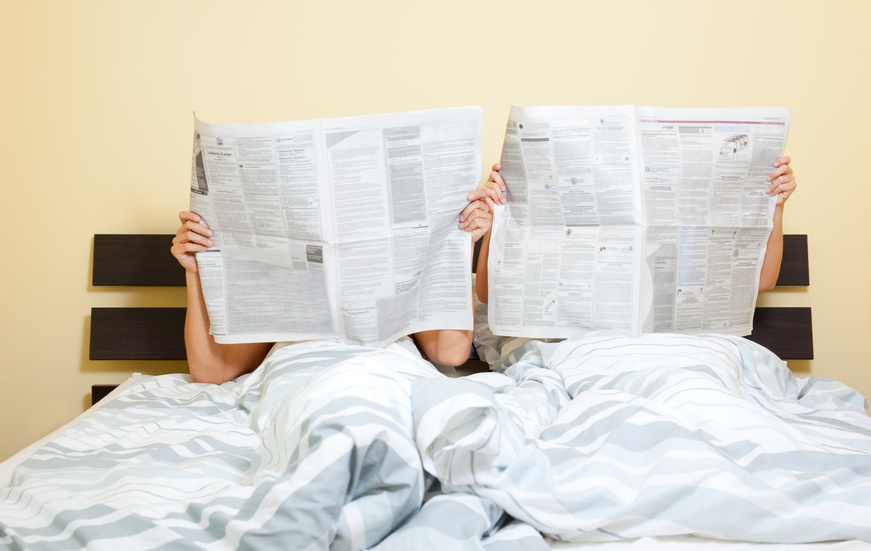 Lately I’ve been thinking about my relationship with the news. Listening to it and reading it right now does not add anything to my life and I can feel it creating anxiety. I feel like a lot of it is irrelevant and features mainly opinions and what might happen rather than going into depth about why something is happening. For me it’s become superficial, energy zapping and fear-inducing.
Lately I’ve been thinking about my relationship with the news. Listening to it and reading it right now does not add anything to my life and I can feel it creating anxiety. I feel like a lot of it is irrelevant and features mainly opinions and what might happen rather than going into depth about why something is happening. For me it’s become superficial, energy zapping and fear-inducing.
So I’ve decided to curb my intake of news. Radically and completely as much as I possibly can.
 I don’t believe that any item of news I have come across in the past couple of years has allowed me to make a better decision about anything serious affecting my life, my career or my business. Maybe that sounds extreme, given the world events of recent years but for me it is the case.
I don’t believe that any item of news I have come across in the past couple of years has allowed me to make a better decision about anything serious affecting my life, my career or my business. Maybe that sounds extreme, given the world events of recent years but for me it is the case.
Part of the issue is the way and how often that we consume news now. Our smart phones are filled with breaking news and the news we come across in newspapers, TV and other mediums are not much different.
News items are bubbles popping on the surface of a deeper world. Will accumulating facts help me understand the world? Sadly, no. The relationship is inverted. I understand far less about the coronavirus, the war in Ukraine and our economic plight from breaking news and more about it from reading in-depth articles and thoughtful journalism in my New Yorker magazine or the Economist.
News can be really toxic for your body – that’s because panic stories, updates and speculation on what might happen next (which isn’t news) constantly triggers your limbic system releasing huge amounts of cortisol. What this means is that your body is in a constant state of stress.
Mental health issues are on the increase generally. There is a lot of uncertainty which pushes us to the news even more, because we believe we are getting and must have information.
In just over a decade, we have faced the largest financial crisis since the 1930s, the worst pandemic since 1919, and now the most serious geopolitical crisis in Europe since the end of the Cold War. This stuff is bubbling in the background and is like the backdrop in a the theatre of our lives which means we can be in state of constant up and down alert most of the time.
This activates our sympathetic nervous system – The sympathetic nervous system directs the body’s rapid involuntary response to dangerous or stressful situations. A flash flood of hormones boosts the body’s alertness and heart rate, sending extra blood to the muscles.

How do we choose which news to give our precious attention to? Damon Brown offers some insights into how easily opinions and non-facts slip into our everyday news consumption and how to become a smarter reader and news consumer.
Here are some more reasons I’m curbing my news intake:
News increases cognitive error – it feeds our biggest barrier to thinking critically: confirmation bias. Warren Buffett said “What the human being is best at doing is interpreting all new information so that their prior conclusions remain intact.” News exacerbates this flaw. If we are already worrying about something, we will find immediate confirmation to fuel this.
News inhibits thinking – Thinking requires concentration. Concentration requires uninterrupted time. News pieces are specifically engineered to interrupt you. They are like mini-viruses stealing attention for their own purposes.
News works like a drug – As soon as we hear a story thread we are compelled to want to know how it continues. Our brain’s nerve cells routinely break old connections and form new ones. The more news we consume, the more we exercise the neural circuits devoted to skimming and multitasking while ignoring those used for reading deeply and thinking with profound focus. This is why, when I read long articles in my New Yorker I start to feel my attention going after a very short time but that’s also starting to improve, the more I read.
News wastes time – if you’re checking your news feed in the mornings for 10 – 15 minutes, again at lunch and then later that day and then add five minutes here and there when you’re at work, then count distraction and refocusing time, you will lose at least half a day every week. Information is no longer a scarce commodity. But attention is. You are not that irresponsible with your money, reputation or health. Why give away your mind?
News makes us passive – News stories are overwhelmingly about things you cannot influence. The daily repetition of news about things we can’t act upon makes us passive. It grinds us down until we adopt a worldview that is pessimistic, desensitised, sarcastic and fatalistic. The scientific term is “learned helplessness”.
So there we are: I’ve taken news apps off my phone, blocked news websites and turned off the radio in the mornings. I can already feel the difference.
